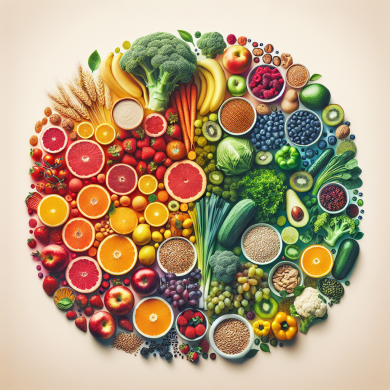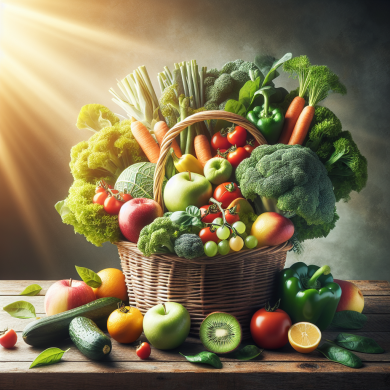Nourishing Choices: Whole Foods vs. Processed Alternatives
Introduction
In the contemporary world of convenience and fast-paced living, making informed dietary choices has become a crucial part of maintaining overall health and well-being. The ongoing debate between whole foods and processed alternatives is central to this discourse. Understanding the differences, benefits, and potential drawbacks of each can empower individuals to make nourishing choices that align with their health goals. This article delves into the intricacies of whole foods versus processed alternatives, offering insights into how these options impact our health and lifestyle.
Defining Whole Foods and Processed Foods
Whole Foods
Whole foods are foods that are consumed in their natural state with minimal to no processing. They are free from artificial additives, preservatives, and other synthetic substances. Examples include fresh fruits and vegetables, whole grains, nuts, seeds, and unprocessed meats and fish. These foods are rich in essential nutrients such as vitamins, minerals, fiber, and antioxidants, which are crucial for optimal health.
Processed Foods
Processed foods, on the other hand, have undergone various methods of preservation or preparation, often involving the addition of salt, sugar, fats, and artificial additives. This category includes a wide range of products from frozen meals and canned goods to snacks and sodas. While some processing is necessary for food safety and preservation, excessive processing can strip foods of their nutritional value and introduce unhealthy ingredients.
Nutritional Value: Whole Foods vs. Processed Foods
Vitamins and Minerals
Whole foods are typically rich in vitamins and minerals essential for maintaining bodily functions. For example, fresh fruits and vegetables provide a wide array of vitamins such as vitamin C, vitamin A, and various B vitamins, along with crucial minerals like potassium and magnesium. In contrast, processed foods often lose these nutrients during processing, and while some are fortified, the bioavailability and balance of these nutrients can be compromised.
Fiber Content
Fiber is a vital component of a healthy diet, promoting digestive health, stabilizing blood sugar levels, and aiding in weight management. Whole foods, especially fruits, vegetables, and whole grains, are excellent sources of dietary fiber. Processed foods, however, often lack sufficient fiber due to refining processes that remove the fibrous parts of the plant, such as bran in grains.
Added Sugars and Fats
Processed foods are notorious for high levels of added sugars and unhealthy fats, which are linked to numerous health issues, including obesity, diabetes, and cardiovascular diseases. Whole foods, in their natural state, do not contain added sugars or unhealthy trans fats, making them a healthier choice for long-term health.
Impact on Health
Weight Management
Choosing whole foods over processed alternatives can significantly aid in weight management. Whole foods are generally lower in calories and higher in nutrients, providing the body with what it needs without excess energy intake. Additionally, the fiber content in whole foods promotes satiety, reducing the likelihood of overeating.
Chronic Disease Prevention
Whole foods play a crucial role in the prevention of chronic diseases. Diets rich in fruits, vegetables, and whole grains have been associated with a lower risk of heart disease, diabetes, and certain cancers. The antioxidants and phytochemicals present in whole foods help combat oxidative stress and inflammation, both of which are underlying factors in many chronic conditions.
Mental Health and Well-being
The benefits of whole foods extend beyond physical health to mental well-being. Nutrient-rich diets support brain function and have been linked to lower rates of depression and anxiety. Conversely, the high sugar content and artificial additives in processed foods can negatively impact mood and cognitive function.
Environmental and Ethical Considerations
Sustainability
The production and consumption of whole foods often have a lower environmental impact compared to processed foods. Whole foods, particularly those that are locally sourced and organic, require fewer resources in terms of packaging, transportation, and energy for processing. This makes whole foods a more sustainable choice for environmentally conscious consumers.
Ethical Implications
Choosing whole foods can align with ethical considerations regarding food production. Many processed foods are produced in ways that exploit labor and contribute to environmental degradation. By opting for whole foods, particularly those that are fair trade and sustainably sourced, consumers can support ethical practices within the food industry.
Practical Tips for Incorporating Whole Foods
Reading Labels
Understanding food labels is essential for making informed choices. Look for products with minimal ingredients and avoid those with high levels of added sugars, sodium, and artificial additives. Whole foods, such as fresh produce, often do not require labels, making them straightforward choices.
Meal Planning
Incorporating whole foods into your diet can be simplified through meal planning. Preparing meals at home allows for greater control over ingredients and portion sizes. Focus on incorporating a variety of fruits, vegetables, whole grains, and lean proteins into your weekly meal plan.
Mindful Eating
Practicing mindful eating encourages a deeper connection with food, helping to appreciate the flavors and nutrients of whole foods. This approach involves savoring each bite, eating slowly, and being present during meals, which can enhance the enjoyment and satisfaction derived from whole foods.
Conclusion
The choice between whole foods and processed alternatives is not just a matter of taste or convenience but a significant decision impacting overall health, well-being, and the environment. Whole foods offer a plethora of benefits, from superior nutritional content to reduced environmental impact and ethical considerations. By prioritizing whole foods, individuals can make nourishing choices that support both personal health and the health of the planet. As awareness grows and access to whole foods improves, embracing these choices can lead to a healthier, more sustainable future.















Add comment